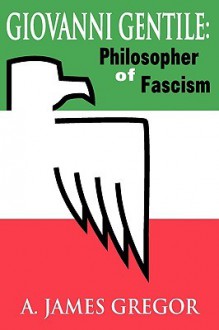Giovanni Gentile: Philosopher of Facism
The recent rise in Europe of extreme right-wing political parties along with outbreaks of violent nationalist fervor in the former communist bloc has occasioned much speculation on a possible resurgence of fascism. At the polemical level, fascism has become a generic term applied to virtually any...
show more
The recent rise in Europe of extreme right-wing political parties along with outbreaks of violent nationalist fervor in the former communist bloc has occasioned much speculation on a possible resurgence of fascism. At the polemical level, fascism has become a generic term applied to virtually any form of real or potential violence, while among Marxist and left-wing scholars discredited interpretations of fascism as a "product of late capitalism" are revived. Empty of cognitive significance, these formulas disregard the historical and philosophical roots of fascism as it arose in Italy and spread throughout Europe. In Giovanni Gentile: Philosopher of Fascism, A. James Gregor returns to those roots by examining the thought of Italian Fascism's major theorist. In Gregor's reading of Gentile, fascism was-and remains-an anti-democratic reaction to what were seen to be the domination by advanced industrial democracies of less-developed or status-deprived communities and nations languishing on the margins of the "Great Powers." Sketching in the political background of late nineteenth-century Italy, industrially backward and only recently unified, Gregor shows how Gentile supplied fascism its justificatory rationale as a developmental dictatorship. Gentile's Actualism (as his philosophy came to be identified) absorbed many intellectual currents of the early twentieth century including nationalism, syndicalism, and futurism and united them in a dynamic rebellion against new perceived hegemonic impostures of imperialism. The individual was called to an idealistic ethic of obedience, work, self-sacrifice, and national community. As Gregor demonstrates, it was a paradigm of what we can expect in the twenty-first century's response, on the part of marginal nations, to the globalization of the industrialized democracies. Gregor cites post-Maoist China, nationalist Russia, Africa, and the Balkans at the development stage from
show less
Format: paperback
ISBN:
9780765805935 (0765805936)
Publish date: January 13th 2004
Publisher: Transaction Publishers
Pages no: 139
Edition language: English

This short little book on the primary Fascist theorist and ideologue, Giovanni Gentile ( -- who comes, like Croce and Stefanini, out of the Subjectivist school of Italian idealism), is a tour du force, and I recommend it highly to anyone interested in the subject of Fascist thought.This book contai...

The fundamental study of one of the most important and original philosophers of fascism -- this book is short, and also contains an important study of the metaphysical foundations of Marxism which is, in my opinion, correct in all but one of its particulars.

